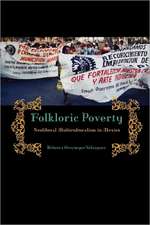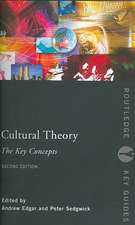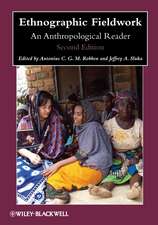Work and Livelihoods: History, Ethnography and Models in Times of Crisis: Routledge Studies in Anthropology
Editat de Susana Narotzky, Victoria Goddarden Limba Engleză Paperback – 31 iul 2018
This volume presents a global range of ethnographic case studies to explore the ways in which - in the context of the restructuring of industrial work, the ongoing financial crisis, and the surge in unemployment and precarious employment - local and global actors engage with complex social processes and devise ideological, political, and economic responses to them. It shows how the reorganization and re-signification of work, notably shifts in the perception and valorization of work, affect domestic and community arrangements and shape the conditions of life of workers and their families.
| Toate formatele și edițiile | Preț | Express |
|---|---|---|
| Paperback (1) | 296.89 lei 43-57 zile | |
| Taylor & Francis – 31 iul 2018 | 296.89 lei 43-57 zile | |
| Hardback (1) | 875.97 lei 43-57 zile | |
| Taylor & Francis – 6 ian 2017 | 875.97 lei 43-57 zile |
Din seria Routledge Studies in Anthropology
-
 Preț: 310.65 lei
Preț: 310.65 lei -
 Preț: 311.76 lei
Preț: 311.76 lei -
 Preț: 326.49 lei
Preț: 326.49 lei -
 Preț: 310.14 lei
Preț: 310.14 lei -
 Preț: 296.84 lei
Preț: 296.84 lei -
 Preț: 328.68 lei
Preț: 328.68 lei -
 Preț: 217.08 lei
Preț: 217.08 lei -
 Preț: 356.66 lei
Preț: 356.66 lei - 18%
 Preț: 1031.03 lei
Preț: 1031.03 lei -
 Preț: 362.32 lei
Preț: 362.32 lei -
 Preț: 362.19 lei
Preț: 362.19 lei - 18%
 Preț: 1039.54 lei
Preț: 1039.54 lei -
 Preț: 420.76 lei
Preț: 420.76 lei -
 Preț: 406.90 lei
Preț: 406.90 lei - 26%
 Preț: 875.97 lei
Preț: 875.97 lei - 18%
 Preț: 1090.54 lei
Preț: 1090.54 lei - 18%
 Preț: 979.22 lei
Preț: 979.22 lei -
 Preț: 424.55 lei
Preț: 424.55 lei -
 Preț: 483.20 lei
Preț: 483.20 lei - 18%
 Preț: 1058.80 lei
Preț: 1058.80 lei - 26%
 Preț: 762.59 lei
Preț: 762.59 lei - 18%
 Preț: 977.69 lei
Preț: 977.69 lei -
 Preț: 426.42 lei
Preț: 426.42 lei - 26%
 Preț: 816.85 lei
Preț: 816.85 lei - 18%
 Preț: 1035.66 lei
Preț: 1035.66 lei - 18%
 Preț: 1086.70 lei
Preț: 1086.70 lei - 18%
 Preț: 1037.34 lei
Preț: 1037.34 lei - 18%
 Preț: 1087.47 lei
Preț: 1087.47 lei - 26%
 Preț: 847.64 lei
Preț: 847.64 lei -
 Preț: 363.28 lei
Preț: 363.28 lei - 18%
 Preț: 1033.34 lei
Preț: 1033.34 lei -
 Preț: 474.72 lei
Preț: 474.72 lei - 26%
 Preț: 817.82 lei
Preț: 817.82 lei - 26%
 Preț: 761.39 lei
Preț: 761.39 lei - 18%
 Preț: 1082.83 lei
Preț: 1082.83 lei - 26%
 Preț: 763.01 lei
Preț: 763.01 lei - 18%
 Preț: 984.67 lei
Preț: 984.67 lei - 26%
 Preț: 765.04 lei
Preț: 765.04 lei -
 Preț: 478.46 lei
Preț: 478.46 lei - 26%
 Preț: 819.84 lei
Preț: 819.84 lei - 18%
 Preț: 1089.01 lei
Preț: 1089.01 lei - 18%
 Preț: 1035.66 lei
Preț: 1035.66 lei
Preț: 296.89 lei
Preț vechi: 340.45 lei
-13% Nou
Puncte Express: 445
Preț estimativ în valută:
56.82€ • 59.02$ • 47.20£
56.82€ • 59.02$ • 47.20£
Carte tipărită la comandă
Livrare economică 03-17 februarie 25
Preluare comenzi: 021 569.72.76
Specificații
ISBN-13: 9781138612860
ISBN-10: 1138612863
Pagini: 238
Ilustrații: 1 Line drawings, black and white; 5 Halftones, black and white; 6 Illustrations, black and white
Dimensiuni: 156 x 234 x 24 mm
Greutate: 0.35 kg
Ediția:1
Editura: Taylor & Francis
Colecția Routledge
Seria Routledge Studies in Anthropology
Locul publicării:Oxford, United Kingdom
ISBN-10: 1138612863
Pagini: 238
Ilustrații: 1 Line drawings, black and white; 5 Halftones, black and white; 6 Illustrations, black and white
Dimensiuni: 156 x 234 x 24 mm
Greutate: 0.35 kg
Ediția:1
Editura: Taylor & Francis
Colecția Routledge
Seria Routledge Studies in Anthropology
Locul publicării:Oxford, United Kingdom
Public țintă
Postgraduate and UndergraduateCuprins
1. Introduction: Work, Livelihoods and Value in Times of Economic Crisis Victoria Goddard and Susana Narotzky 2. The Saturn Automobile Corporation and the Long Dispossession of U.S. Autoworkers Sharryn Kasmir 3. Post-Fordist Work Organization and Daily Life from a Gender Perspective: The Case of FIAT-SATA in Melfi Fulvia D’Aloisio 4. Value and "Worthlessness" in Electrical Manufacturing: Class, Time, and Location in the Critical Junctions Approach Don Kalb 5. Post-Industrial Landscapes and Memories: The Silesian Case Kazimiera Wódz and Monika Gnieciak 6. Learning How to Work and Struggle Through the Generations at SOMISA-SIDERAR: A Public Steel Plant Turned Private Patricia Vargas and Laura Perelman 7. Work and Social Reproduction in the Shipbuilding Industry of Piraeus Manos Spyridakis 8. Getting By Beyond Work, or the Intertwining of Production and Reproduction Among Heavy Industry Workers and Their Families in Ferrol, Spain Irene Sabaté Muriel 9. Disruptions and Continuities in Rethinking Volta Redonda, CSN and Its Workers in Time Gonzalo Díaz Crovetto 10. Workers and Populism in Slovakia: Workers, History and Continuity in the Slovakian Steel Industry Juraj Buzalka and Michaela Ferencová 11. Profession, Masculinity, and Identity: Biographical Crisis of British and German Steelworkers in Comparison Vera Trappmann 12. From Factory Work to Cottage Industry: Consequences of Deindustrialization for Local and Domestic Economies Frances Pine 13. Final Comments Lydia Morris
Recenzii
"Should anyone be interested in recent ethnographies of the working class, political ecology, anthropology of space and place, extractive industries, post-socialism and understanding precarity and informal workers’ networks, this volume is indispensable." - Imola Püsök, University of Pécs, American Anthropological Association
Descriere
This volume presents a global range of ethnographic case studies to explore the ways in which - in the context of the restructuring of industrial work, the ongoing financial crisis, and the surge in unemployment and precarious employment - local and global actors engage with complex social processes and devise ideological, political, and economic responses to them. It shows how the reorganization and re-signification of work, notably shifts in the perception and valorization of work, affect domestic and community arrangements and shape the conditions of life of workers and their families.

















